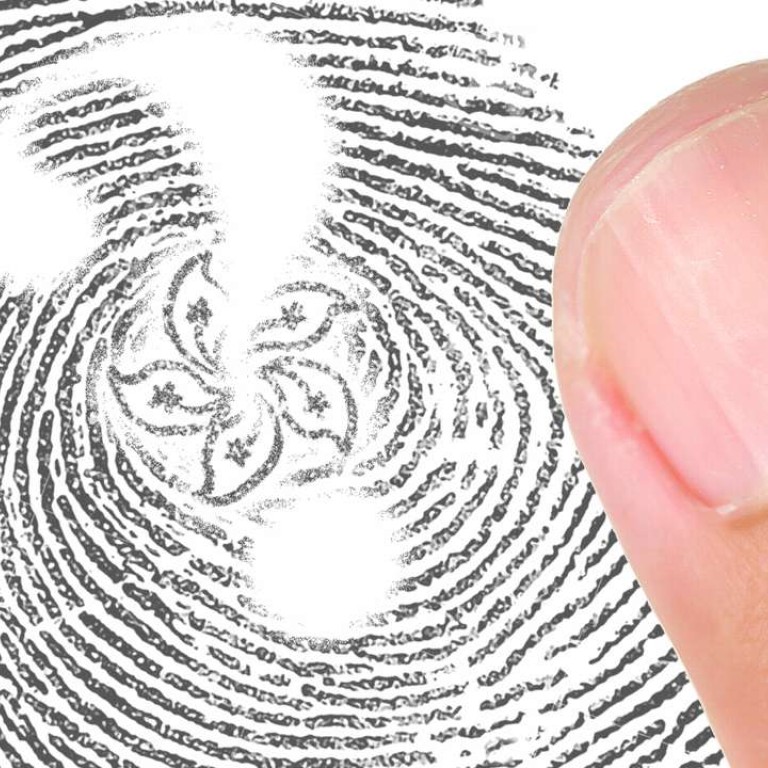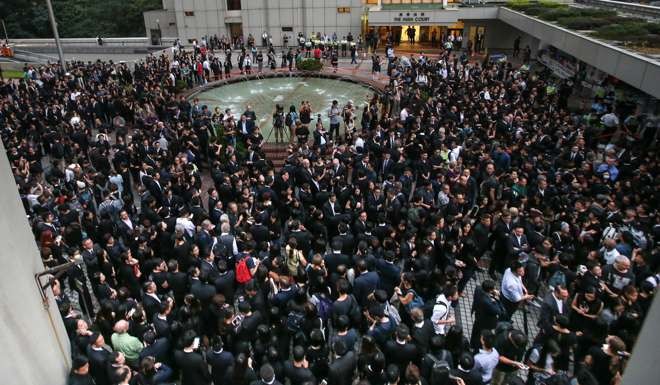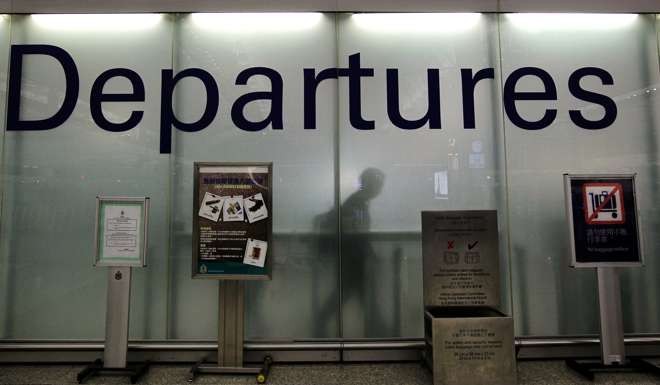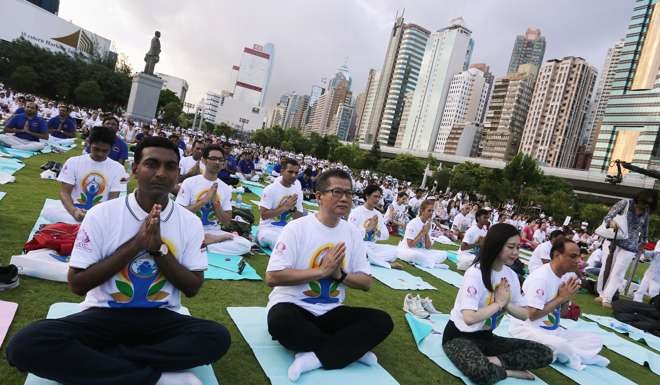
What identity crisis? Hongkongers confront questions of belonging after Legco oath saga
Controversy over swearing allegiance to the city and the country in the legislature reignites debate over unique identity of Hong Kong and its residents
What is a Hongkonger? The answer is anything but simple.
The complex debate has been reignited after two localist lawmakers were plunged into a disqualification row due to their pledges to the “Hong Kong nation” at the beginning of the legislative year on October 12.
Youngspiration members Sixtus Baggio Leung Chung-hang and Yau Wai-ching have protested over what they perceive as Beijing’s attempt to exert greater control over the Special Administrative Region by issuing an interpretation of the city’s mini-constitution, the Basic Law, to determine what can be considered an adequate oath. Now as many as 15 legislators have been told they could face expulsion for “insincere oath-taking”.
The controversy has divided Hongkongers, with some suggesting the localists were right to assert their views of independence, while others claimed the pair had caused unnecessary political conflict.

Professor Gordon Mathews, from the Department of Anthropology at Chinese University, said he had witnessed a significant shift in how his students felt about their ethnicity since the handover in 1997.
“Twenty years ago, if you’d asked students in my class about their identity, they would have said Hong Kong Chinese or Chinese,” he said. “There was no stigma attached to saying Chinese. Today, you hear some people saying they are Chinese, but not many. This is a remarkable change.”
But the term “Hongkonger” extends well beyond politics and nationality, and crosses into definitions of culture, ethnicity, race and morality.
Ethnic labels
Ethnically, the population of the city is overwhelmingly Chinese (about 92 per cent according to the 2011 census), but in recent polls, most identified themselves as Hongkongers rather than Chinese.
About four in 10 residents described themselves as Hongkongers (41.6 per cent), while a quarter (25.1 per cent) identified as a Hongkonger in China, according to a poll of 1,007 people this year by the University of Hong Kong.
According to the same poll, 38 per cent of residents simply described themselves as being of mixed identity, and less than a fifth (17.8 per cent) identified as Chinese, while just 12.9 per cent said they were Chinese in Hong Kong.
Despite the hesitancy among most Hongkongers to describe themselves as Chinese, Dr Beatrice Oi-yeung Lam, lecturer in sociology at HKU, said she would be “cautious” in making a claim that they were “ashamed to be identified as Chinese”.
“There are different dimensions of ‘Chineseness’ when we talk about the identification of oneself being Chinese,” she said. “A person self-identified as a Hongkonger may consider oneself as culturally Chinese, but at the same time harbour reservations about the political regime of the People’s Republic of China and how ‘Chineseness’ is framed under this political regime.

“To a certain extent categories of ‘Hongkongese’, ‘Hong Kong Chinese’ and ‘Chinese’ are categories constructed in identity surveys. What these categories mean to laypeople in Hong Kong is bound to vary, and meanings are not always as clear-cut as they appear to be. To put it another way, there are limitations in relying on these identity surveys to make sense of how people in Hong Kong identify themselves.”
Mathews said the term “Hongkonger” had become synonymous with core values such as political transparency, the rule of law and freedom of speech.
But he said he had observed the cultural gap between Hongkongers and mainland Chinese students “diminishing” in his classroom, because both were increasingly from relatively privileged backgrounds.
“The superiority complex [among Hong Kong-born students] was greater before than it is now,” he said.
Local pop culture
Radio personality Gary Ngan Luen-mo, whose career spans three decades, has witnessed first hand the evolution of Hong Kong culture and the rise and fall of many pop culture trends that have helped shape the city and define its identity. Ngan believes Hong Kong has been and always will be heavily influenced by the mainland as well as the West.
“We are the best example of what a multicultural society should be. We not only incorporate ideas from all over the world, we let them flourish,” Ngan said.
“Look at our music. In the 1950s and 60s, most of it was heavily influenced by southern China and Shanghai, and in the 60s and 70s we fell head over heels for Western music like The Beatles and Patti Page. Our pop culture has always been largely defined by music that’s influenced by the West. Look at Leslie Cheung and Anita Mui.”

Age gap and identity
Studies have found young Hongkongers more likely to distance themselves from their Chinese heritage than their parents were.
In The Ethos of the Hong Kong Chinese (1988), Liu Zhaojia and Kuan Hsin-chi summarised the results of a survey that looked at how Hongkongers of a variety of ages felt about their cultural identity before the handover of 1997.
They found those who claimed a Hong Kong identity rather than a Chinese one were, perhaps predictably, “younger in age, more educated and higher in occupational status”. They also had a more “modern political outlook” and were more “trustful” of Hong Kong’s government than China’s.
The authors concluded that this “identity differentiation” within society would continue to intensify. They went on to predict that the resulting tensions would “inevitably have significant reverberations for future political changes in Hong Kong”.
But this disparity in perspectives on ethnic identity could be lessening, according to Alan Cheng, a 25-year-old born-and-raised Hongkonger. The young entrepreneur, who attended university in the United States and has since founded medical technology start-up House Doctor in Hong Kong, said he was familiar with both young and older residents who would describe themselves as a “Hongkonger” because of the current political climate.
“That is growing because the mainland Chinese influence is coming into Hong Kong,” he said. “The only ones who want to identify themselves as hardcore Chinese are those with political or business interests in China.”
Cheng said he no longer thought education was a barrier to identifying oneself as a Hongkonger.
“It is not necessarily about education any more, it is about who you surround yourself with,” he said.
“We want to identify the good values we have here in Hong Kong. And in terms of our characteristics; we are creative, funny, smart, quick on our feet and we are good at finding solutions to problems.”
The Hong Kong spirit
Long-time Hong Kong resident and founder of Lan Kwai Fong Allan Zeman is proud of the city’s vibrancy, its can-do spirit and great aura of history.
“A Hongkonger is someone who is very worldly. Many grew up with an English upbringing pre-1997, and post-97 have been brought up in more of a Chinese system. Hong Kong is a place that has had ups and downs throughout the years. But it’s always managed to pull itself together, and it’s got a small town feel,” Zeman said.
“It’s exciting and international. Some people are more Chinese than Western, some are more Western than Chinese. Having that blend really helps. Most Hongkongers travel abroad, travel all over the world, and travel to China a lot as well. They pick up cultures from all over the world and bring them back here.
“Hongkongers have a can-do spirit. They in general are very practical people. They make do with what they have and are very creative.”
Ngan said creativity had acted as an engine to propel the city onto the world stage.
“We are like a sponge; we absorb everything around us, take out the best and in no time create something of our own with no trace of the original object. We are very resourceful and creative,” he said.
Island mentality
Academics suggest the term “Hongkonger” is derived from a variety of sociological, cultural and economic factors.
In Return Migration and Identity: A Global Phenomenon, A Hong Kong Case (2010), Nan M. Sussman emphasised that cultural identity is inherently linked to geographical location. She highlighted how Hong Kong, as a collection of islands in part, had traditionally been a port for global trade, which simultaneously left it vulnerable to “seaborne invaders”. As well as navigating this contradiction, Hongkongers have had to adapt to living with limited agricultural resources and one of the highest population densities in the world.
She said Hongkongers displayed “persistence, hard work, shrewdness and cooperation” because of their often cramped living conditions.

She added that the British occupation of Hong Kong from 1841 to 1997 gave Hongkongers new characteristics including the prioritisation of an individual’s life goals ahead of his or her family’s aims, and a need to see all relationships as equal but with a tendency to assume the superior position if they were not.
“These Western concepts became layered over Hongkongers’ core Chinese identity,” she wrote.
Lam said it was not until several decades after the second world war that people started to consider Hong Kong as a permanent home, which meant the concept of being a “Hongkonger” was still relatively new.
“What traces back to the 1970s, when a sense of local belonging emerged, is people in Hong Kong began to see it as their home rather than a temporary shelter, as it was perceived in the early post-war period,” she said. “That was the time when control of cross-border population flow tightened and when the distinction between Hong Kong and mainland China – in socio-economic terms and in political terms – became more palpably felt. To identify oneself as belonging to Hong Kong is, increasingly, to identify oneself as different and distinct from mainland China.”
Relationship with mainland Chinese
All of these factors undoubtedly influence how a Hongkonger might relate to their mainland Chinese counterparts.
John Carroll, professor of history at HKU, said anti-mainlander sentiment among Hongkongers seemed to have decreased since the pro-democracy Occupy protests of 2014, in part because people appeared more hostile towards the Hong Kong government.
He said Hongkongers’ key complaints about mainlanders related to them coming into the city to buy property, milk formula, and use Hong Kong hospitals to give birth.
“Anti-mainland feelings seem to have disappeared more,” he said. “People aren’t talking about it as much as before. Some university students [from the mainland] find it easy to integrate. Some of them feel quite welcome. Some don’t. But that’s part of the story that has to be kept in mind.”
Although there is still a lot of animosity towards mainland China, it’s less towards mainlanders and more towards the central government, Carroll said.
“Now people realise the mainland is changing very quickly and I don’t think a lot of Hongkongers are ready to accept that,” he said. “What’s happening with the interpretation of the Basic Law, that will
only reinforce some of those feelings.”
Lessons from history
In the paper China as “Other”, Resistance to and Ambivalence Towards National Identity in Hong Kong, Chan Chi-kit argued the social divisions between Hongkongers and mainland Chinese were caused by past events, namely “controversies and contentions arising from national education, the transborder flow of people, and the provision of goods and public services for non-locals”.
Lam said some Hongkongers may identify themselves as ethnically Chinese but still resist using the term in a political context because of the region’s ongoing conflicts with mainland China.
“I believe a critical analysis about identity issues in the Hong Kong-China context requires knowledge of the historical context in which identification comes about and evolves as Hong Kong-China relations change,” she said.
Writing in her paper On the Social Integration of Chinese Immigrants in Post-handover Hong Kong: Rethinking the Hong Kong Person, she said the modern Hongkonger was a product of “a neo-liberal governmentality”.
“The ongoing ‘ethnic’ tension is expected to see no sign of diminishing, and the kind of ‘harmonious relationship’ Chief Executive [Leung Chun-ying] clamours for is unlikely to materialise in the close future,” she said.
Migration trends
While Hongkongers appear to be taking on an increasingly concrete identity distinctive from their mainland counterparts, the city is in a peculiar position in terms of its migration trends.
The latest statistics suggest it has a large proportion of people who want to leave the city, but a declining number of residents who actually emigrate.
An estimated 7,000 people emigrated from the city last year, a significant decline from 2005 when about 9,800 moved overseas, according to the Security Bureau.
Despite this, almost 40 per cent of Hongkongers reported wanting to leave the city, a recent study by Chinese University found. But of those, only one in 10 had actually made plans to do so. Those surveyed gave their main reasons as overcrowding, dissatisfaction with the government, as well as political and social disputes.

The poll of 710 people, conducted by the university’s Hong Kong Institute of Asia-Pacific Studies in September this year, suggested younger people were more keen to move than older residents.
The findings were supported by another survey in June, where researchers from think tank Civic Exchange found 42 per cent of Hongkongers wanted to leave. The poll, which surveyed 1,500 people, revealed that 70 per cent thought the city had become “worse” or a “much worse” place to live. Canada and Taiwan have proved popular destinations for those who managed to make the move.
To put this into context, the small number of people emigrating from Hong Kong in recent years contrasts starkly with the trend before the handover. Between 1984 and 1997, almost 800,000 Hongkongers left the territory. But interestingly, an estimated 500,000 immigrants returned post-1997, according to Sussman, who suggested they had only ever intended their move abroad to be temporary.

Additional reporting by Jessie Lau

